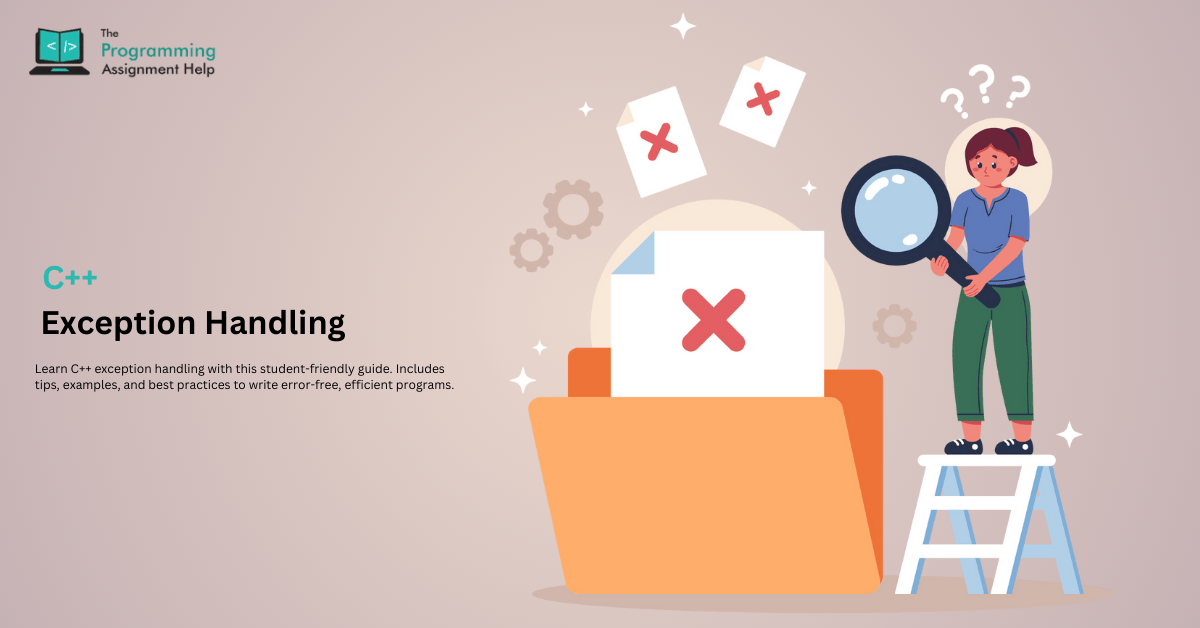
- 26th Aug 2025
- 16:54 pm
- Robert Nill
Have you ever been in a case when your C++ program simply fails due to some minor mistake such as a division by zero or reading a file that does not exist? If yes, you’ve already encountered what exception handling is designed to solve. C++ exception handling is one of the most confusing topics many students have but an understanding of exception handling can be used to write error-free code.
This blog will describe what exception handling is, why it is important in your assignments, the kind of error to avoid, and some practical examples to ensure you find your life easier. Are you still facing difficulties? Don’t fret, as a professional C++ Assignment Help is there to help you out of complicated subjects.
What is Exception Handling in C++?
Exception handling in C++ is a feature that enables a programmer to deal with any error without necessarily causing a crash to the program. Rather than the unexpected failure of your application, exceptions can be used to identify the errors and act on them accordingly.
For example:
- Division by zero
- Accessing invalid memory
- File not found
- Invalid user input
Exception handling enables you to make sure your program safely continues, even in face of an error.
Key Concepts of Exception Handling in C++
C++ uses three main keywords for exception handling:
- try → Block of code where an exception might occur.
- throw → Used to signal that an exception has occurred.
- catch → Handles the exception thrown.
Basic Syntax:
try {
// Code that might cause an exception
if (denominator == 0) {
throw std::runtime_error("Division by zero error");
}
result = numerator / denominator;
} catch (const std::exception& e) {
std::cerr << "Exception caught: " << e.what() << std::endl;
}
Why Exception Handling is Important for Students
- Prevents unexpected program crashes.
- Improves code quality and debugging.
- Essential for file handling, database operations, and networking tasks.
- It appears regularly in tests, coding interviews and exams.
Common Mistakes Students Make
- Not including or headers.
- Catching all exceptions using catch(...) instead of specific types.
- Throwing exceptions for regular logic instead of real errors.
- Forgetting to handle exceptions in nested functions.
Practical Example: Handling File Errors
The example is that you are supposed to read something out of file. Your program must not crash in a case when the file does not exist.
#include
#include
#include
int main() {
std::ifstream file("data.txt");
try {
if (!file) {
throw std::runtime_error("File not found");
}
std::cout << "File opened successfully!" << std::endl;
} catch (const std::exception& e) {
std::cerr << "Error: " << e.what() << std::endl;
}
return 0;
}
What is so important here? Assignments always include file processing, and smart exception handling will benefit you at grades.
Why Mastering This Topic Matters
- Improves assignment scores by showing advanced coding skills.
- Builds confidence for real-world projects.
- Prepares you for technical interviews.
Need Help with C++ Assignments?
Exception handling seems to be difficult at first, but experience makes it easier. It could be C++ challenging jobs, bugs to be resolved, or concepts that are not grasped like OOP, use of pointers or exception handling, but our professionals can help with it.
Get professional C++ Assignment Help to:
- Write clean, error-free code.
- Submit assignments on time.
- Understand concepts with 1:1 tutor support.
Don't let tricky C++ info stop you—reach out to our professionals currently and enhance your grades!








